Related Research Articles
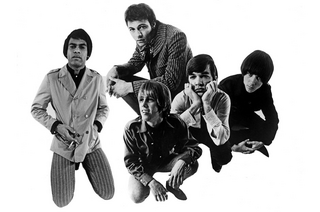
Love is an American rock band formed in Los Angeles in 1965. Led by Arthur Lee, Love was one of the first racially diverse American rock bands. Their style, sometimes characterized as garage rock, folk rock, and psychedelic, drew from an eclectic range of sources including, blues, jazz, flamenco, and orchestral pop. In recent years, they have toured under the title of The Love Band or Love Revisited, with guitarist Johnny Echols as the only original member.

Jefferson Airplane was an American rock band based in San Francisco, California, that became one of the pioneering bands of psychedelic rock. Formed in 1965, the group defined the San Francisco Sound and was the first from the Bay Area to achieve international commercial success. They were headliners at the Monterey Pop Festival (1967), Woodstock (1969), Altamont Free Concert (1969), and the first Isle of Wight Festival (1968) in England. Their 1967 break-out album Surrealistic Pillow was one of the most significant recordings of the Summer of Love. Two songs from that album, "Somebody to Love" and "White Rabbit", are among Rolling Stone's "500 Greatest Songs of All Time".
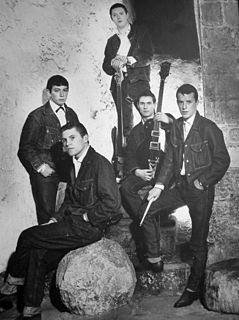
The Animals are an English rhythm-and-blues and rock band, formed in Newcastle upon Tyne in the early 1960s. The band moved to London upon finding fame in 1964. The Animals were known for their gritty, bluesy sound and deep-voiced frontman Eric Burdon, as exemplified by their signature song and transatlantic number-one hit single "The House of the Rising Sun" as well as by hits such as "We Gotta Get Out of This Place", "It's My Life", "Don't Bring Me Down", "I'm Crying", "See See Rider" and "Don't Let Me Be Misunderstood." The band balanced tough, rock-edged pop singles against rhythm-and-blues-oriented album material and were part of the British Invasion of the US.
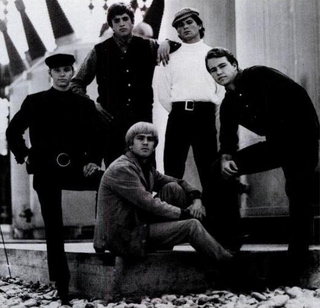
The Electric Prunes are an American psychedelic rock band, formed in Los Angeles, California, in 1965. Much of the band's music was, as music historian Richie Unterberger described it, possessed of "an eerie and sometimes anguished ambiance." It mainly consisted of material by songwriters Annette Tucker and Nancie Mantz, though the group also penned their own songs. Incorporating psychedelia and elements of embryonic electronic rock, the band's sound was marked by innovative recording techniques with fuzz-toned guitars and oscillating sound effects. In addition, guitarist Ken Williams' and singer James Lowe's concept of "free-form garage music" provided the band with a richer sonic palette and exploratory lyrical structure than many of their contemporaries.

Country Joe and the Fish was an American psychedelic rock band formed in Berkeley, California, in 1965. The band was among the influential groups in the San Francisco music scene during the mid- to late 1960s. Much of the band's music was written by founding members Country Joe McDonald and Barry "The Fish" Melton, with lyrics pointedly addressing issues of importance to the counterculture, such as anti-war protests, free love, and recreational drug use. Through a combination of psychedelia and electronic music, the band's sound was marked by innovative guitar melodies and distorted organ-driven instrumentals which were significant to the development of acid rock.

"In the Midnight Hour" is a song originally performed by Wilson Pickett in 1965 and released on his 1965 album of the same name, also appearing on the 1966 album The Exciting Wilson Pickett. The song was composed by Pickett and Steve Cropper at the historic Lorraine Motel in Memphis, later the site of the assassination of Martin Luther King Jr. Pickett's first hit on Atlantic Records, it reached number one on the R&B charts and peaked at number 21 on the pop charts.
Rotary Connection was an American psychedelic soul band, formed in Chicago in 1966.
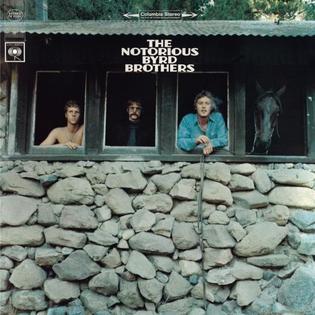
The Notorious Byrd Brothers is the fifth album by the American rock band the Byrds, and was released in January 1968, on Columbia Records. The album represents the pinnacle of the Byrds' late-‘60s musical experimentation, with the band blending together elements of psychedelia, folk rock, country, electronic music, baroque pop, and jazz. With producer Gary Usher, they made extensive use of a number of studio effects and production techniques, including phasing, flanging, and spatial panning. The Byrds also introduced the sound of the pedal steel guitar and the Moog modular synthesizer into their music, making it one of the first LP releases on which the Moog appears.
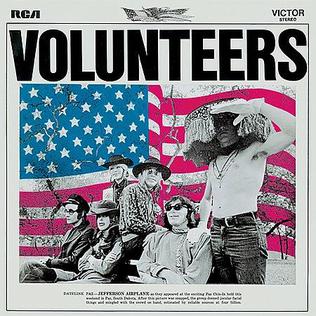
Volunteers is the fifth studio album by American psychedelic rock band Jefferson Airplane, released in 1969 on RCA Records. The album was controversial because of its revolutionary and anti-war lyrics along with the use of profanity. The original album title was Volunteers of Amerika, but it was shortened after objections from Volunteers of America.

"Hey Joe" is an American song from the 1960s that has become a rock standard and has been performed in many musical styles by hundreds of different artists. The lyrics tell of a man who is on the run and planning to head to Mexico after shooting his unfaithful wife. In 1962, Billy Roberts registered "Hey Joe" for copyright in the United States.

Fifth Dimension is the third album by the American rock band the Byrds and was released in July 1966 on Columbia Records. Most of the album was recorded following the February 1966 departure of the band's principal songwriter Gene Clark. In an attempt to compensate for Clark's absence, guitarists Jim McGuinn and David Crosby stepped into the breach and increased their songwriting output. In spite of this, the loss of Clark resulted in an album with a total of four cover versions and an instrumental, which critics have described as "wildly uneven" and "awkward and scattered". However, the album is notable for being the first by the Byrds not to include any songs written by Bob Dylan, whose material had previously been a mainstay of the band's repertoire.

Crown of Creation is the fourth studio album by the San Francisco psychedelic rock band Jefferson Airplane, and was released by RCA Victor in September 1968. It saw the band continuing their development of psychedelic music from their previous album, After Bathing at Baxter's.
The Litter was an American psychedelic and garage rock band, formed in 1966 in Minneapolis, Minnesota, United States. They are best remembered for their 1967 debut single, "Action Woman". The group recorded three albums in the late 1960s before disbanding, but they re-united in 1990, 1992, and again in 1998, when they recorded a new studio album consisting of both old and new material. All of their Minneapolis recorded material was produced by Warren Kendrick, who owned the Scotty and Warick and Hexagon labels.

H. P. Lovecraft was an American psychedelic rock band, formed in Chicago, Illinois, in 1967 and named after the horror writer H. P. Lovecraft. Much of the band's music was possessed of a haunting, eerie ambience, and consisted of material that was inspired by the macabre writings of the author whose name they had adopted. Combining elements of psychedelia and folk rock, the band's sound was marked by the striking vocal harmonies of ex-folk singer George Edwards and the classically trained Dave Michaels. In addition, Michaels' multi-instrumentalist abilities on organ, piano, harpsichord, clarinet and recorder provided the band with a richer sonic palette than many of their contemporaries.
Clear Light was an American psychedelic rock band that was formed in Los Angeles, California in 1966. The group released one studio album, Clear Light. It had moderate national success before the group disbanded.
Ultimate Spinach was an American psychedelic rock band from Boston, Massachusetts which was formed in 1967. In terms of style and national recognition, the band was one of the most prominent musical acts to emerge from the "Bosstown Sound", which was a marketing campaign posing as a regional attempt to compete with the San Francisco Sound. During the group's existence, they released three albums, with their self-titled debut the most commercially successful.
Not to be confused with Styx (band)
Kevin Daniel Kelley was an American drummer, best known for his work with the rock bands the Byrds and the Rising Sons. Kelley also played drums for Fever Tree, although it is unknown whether he was an official member of the group or not. Kelley is the cousin of country rock pioneer and ex-member of the Byrds and the Flying Burrito Brothers, Chris Hillman.
The Plastic Cloud was a Canadian psychedelic rock band formed in Bay Ridges, Ontario, Canada in 1967 and which existed for approximately a year thereafter.
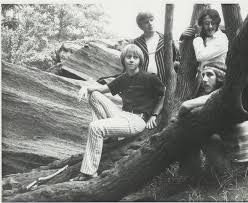
The Morning Dew was an American garage rock band formed in Topeka, Kansas, and active between 1966 and 1971. In the group's existence, they became a popular attraction, spearheading the growth of psychedelic music in the region. They produced one now sought after studio album that exemplifies their experimental transition into psychedelic rock.
References
- ↑ Keith Pettipas. "The Ant Trip Ceremony – Biography". allmusic.com. Retrieved March 22, 2015.
- ↑ "ANT TRIP CEREMONY - 24 HOURS". cicadelic.com. Retrieved March 22, 2015.
- ↑ "Ant Trip Ceremony band". last.fm. Retrieved March 22, 2015.
- ↑ "Ant Trip Ceremony". psychedeicized.com. Retrieved March 22, 2015.
- ↑ "Ant Trip Ceremony". buckeybeat.com. Retrieved March 22, 2015.
- ↑ "Ant Trip Ceremony - 24 Hours". discogs.com. Retrieved March 22, 2015.